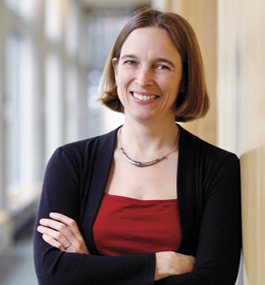Better to Receive Than to Give

Wendy Cadge
by Jarret Bencks
If their prayers for the U.S. House of Representatives and Senate are any indication, congressional chaplains have a good deal of faith in the Bible verse “Ask, and it shall be given you.”
A unique study by Brandeis and Clemson University researchers reveals that congressional chaplains are very good at asking God for help and much less interested in praising or thanking him.
The study, published in the Journal of Church and State, examined several components of 200 prayers offered by three Senate and two House chaplains to Congress in 1990, 2000 and 2010. Ninety-six percent of the prayers, or 191 of them, asked for something. (Apparently, few of the petitions asked the Almighty to help the U.S. Congress become more bipartisan.)
In 22 percent of the prayers, the chaplains offered thanks to God. They praised God even less — in 17 percent of the prayers. They “bore witness” in 71 percent.
“Although all five chaplains in our research invoked the name of God, we found few other commonalities across either the style or content of their prayers,” says sociology professor Wendy Cadge, who co-authored the study with Clemson political science professor Laura Olson and Brandeis graduate student Margaret Clendenen.
“The chaplains mixed pastoral and prophetic messages in ways not clearly connected to current events, election cycles or levels of congressional polarization,” says Cadge. And though Senate chaplains shifted from largely Christian to more religiously neutral prayer language between 1990 and 2010, House chaplains did not.
Each of the three Senate chaplains developed his own prayer style, says Cadge. Richard Halverson quoted the Bible in almost every prayer, spoke regularly of Congress, and often mentioned senators and staff by name. His successor, L. John Ogilvie, actively reminded senators of their responsibilities before God and the nation in providential terms. Current chaplain Barry Black has never quoted the Bible and has mentioned Jesus only once, in reference to the Christmas story. These differences reveal a shift from a more explicitly Judeo-Christian approach toward more religiously neutral language, says Cadge.
The congressional chaplaincy dates back to 1774 when Jacob Duché, rector of Christ Episcopal Church in Philadelphia, was recruited to offer prayers before the First Continental Congress. But having chaplains in the halls of political power has also been controversial. In the 1850s, Congress received a number of petitions calling for the elimination of the position on the grounds of separation of church and state. In 1983, the Supreme Court’s ruling in Marsh v. Chambers permitted the practice of legislative prayer on the basis of historical custom.
